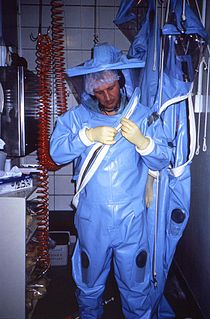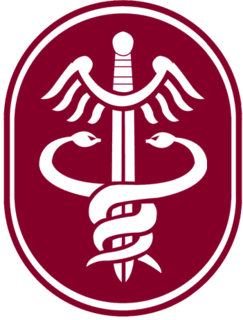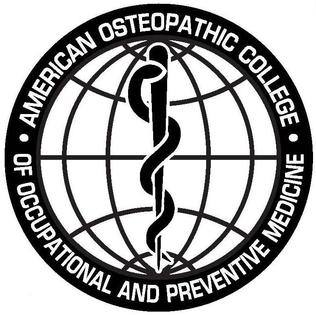
Biosafety is the prevention of large-scale loss of biological integrity, focusing both on ecology and human health. These prevention mechanisms include conduction of regular reviews of the biosafety in laboratory settings, as well as strict guidelines to follow. Biosafety is used to protect from harmful incidents. Many laboratories handling biohazards employ an ongoing risk management assessment and enforcement process for biosafety. Failures to follow such protocols can lead to increased risk of exposure to biohazards or pathogens. Human error and poor technique contribute to unnecessary exposure and compromise the best safeguards set into place for protection.

A flight surgeon is a military medical officer practicing in the clinical field of aviation medicine. Although the term "flight surgery" is considered improper by purists, it may occasionally be encountered.

Battlefield medicine, also called field surgery and later combat casualty care, is the treatment of wounded combatants and non-combatants in or near an area of combat. Civilian medicine has been greatly advanced by procedures that were first developed to treat the wounds inflicted during combat. With the advent of advanced procedures and medical technology, even polytrauma can be survivable in modern wars. Battlefield medicine is a category of military medicine.

The U.S. Army Medical Command (MEDCOM) is a direct reporting unit of the U.S. Army that formerly provided command and control of the Army's fixed-facility medical, dental, and veterinary treatment facilities, providing preventive care, medical research and development and training institutions. On 1 October 2019, operational and administrative control of all military and veteran medical facilities transitioned to the Defense Health Agency.

The Army Medical Department of the U.S. Army (AMEDD), formerly known as the Army Medical Service (AMS), encompasses the Army's six medical Special Branches. It was established as the "Army Hospital" in July of 1775 to coordinate the medical care required by the Continental Army during the Revolutionary War. The AMEDD is led by the Surgeon General of the U.S. Army, a lieutenant general.
Polytrauma and multiple trauma are medical terms describing the condition of a person who has been subjected to multiple traumatic injuries, such as a serious head injury in addition to a serious burn. The term is defined via an Injury Severity Score (ISS) equal to or greater than 16. It has become a commonly applied term by US military physicians in describing the seriously injured soldiers returning from Operation Iraqi Freedom in Iraq and Operation Enduring Freedom in Afghanistan. The term is generic, however, and has been in use for a long time for any case involving multiple trauma.
Occupational medicine, until 1960 called industrial medicine, is the branch of medicine which is concerned with the maintenance of health in the workplace, including prevention and treatment of diseases and injuries, with secondary objectives of maintaining and increasing productivity and social adjustment in the workplace.
Health is the state of complete physical, mental, and social well-being and a positive concept emphasizing social and personal resources, as well as physical capacities. This article lists major topics related to personal health.
Class R:Medicine is a classification used by the Library of Congress Classification system. This page outlines the subclasses of Class R.

The Defence Chemical, Biological, Radiological and Nuclear Centre is a United Kingdom military facility at Winterbourne Gunner in Wiltshire, south of Porton Down and about 4 miles (6 km) northeast of Salisbury. It is a tri-service location, with the Army being the lead service. The centre is responsible for all training issues relating to chemical, biological, radiological and nuclear (CBRN) defence and warfare for the UK's armed forces.
The use of podiatry drills, in the absence of engineering controls and personal protective equipment, is an occupational hazard to the healthcare provider. Nail dust collected during foot care procedures performed in office settings has been found to contain keratin, keratin hydrolysates, microbial debris, and viable fungal elements, including dermatophytes and saprotrophs. Exposure to nail dust and the associated risk will vary with the policies and practices in place, the type of podiatry drill used, therapy technique, frequency of procedures, personal protective equipment utilized and the use of ventilation systems.

The term military medicine has a number of potential connotations. It may mean:
The following outline is provided as an overview of and topical guide to medicine:

Military psychology is a specialization within psychology that applies psychological science to promote the readiness of military members, organizations, and operations. Military psychologists provide support to the military in many ways, including through direct clinical care, consultation to military commanders, teaching others and supporting military training, and through research relevant to military operations and personnel. The stressors associated with military service are many to include exposure to high-risk training and combat. As such, psychologists are critical support components that assist military leaders in designing appropriate training programs, providing oversight to those programs, and assisting military members as they navigate the challenges of military training and military life in general. Most issues facing military members are not that dissimilar from those faced by their civilian counterparts. Specific examples of the issues faced by military personnel that may be somewhat distinct include posttraumatic stress disorder (PTSD) associated with combat, or guilt and family/partner difficulties accompanying extended or frequent deployments due to separation. Clinical providers in military psychology are often focused on the treatment of stress, fatigue, and other personal readiness issues.

A Special Amphibious Reconnaissance Corpsman (SARC) is a United States Navy hospital corpsman who provides MARSOC and other USSOCOM units advanced trauma management associated with combatant diving and parachute entry. Traditionally, they are attached to the Marine Corps Force Reconnaissance companies to help support the Command Element of the Marine Air-Ground Task Force in special reconnaissance missions.
Medical toxicology is a subspecialty of medicine focusing on toxicology and providing the diagnosis, management, and prevention of poisoning and other adverse effects due to medications, occupational and environmental toxicants, and biological agents. Medical toxicologists are involved in the assessment and treatment of a wide variety of problems, including acute or chronic poisoning, adverse drug reactions (ADRs), drug overdoses, envenomations, substance abuse, industrial accidents, and other chemical exposures.
68W is the Military Occupational Specialty (MOS) for the United States Army's Combat Medic. 68Ws are primarily responsible for providing emergency medical treatment at point of wounding on the battlefield, limited primary care, and health protection and evacuation from a point of injury or illness. This specialty is open to males and females with minimum line scores of 107 GT and 101 ST on the Armed Services Vocational Aptitude Battery.

The American Osteopathic College of Occupational & Preventive Medicine (AOCOPM) is the national osteopathic medical specialty college for preventive medicine physicians, founded in 1979. AOCOPM consists of three divisions of population-based medicine: Aerospace & Hyperbaric medicine, Occupational & Environmental medicine and Public Health & General Preventive medicine. AOCOPM is an affiliate society of the American Osteopathic Association (AOA), AOCOPM is currently located in Harrogate, Tennessee, the home of Lincoln Memorial University-DeBusk College of Osteopathic Medicine.
The United States biological defense program—in recent years also called the National Biodefense Strategy— refers to the collective effort by all levels of government, along with private enterprise and other stakeholders, in the United States to carry out biodefense activities.










